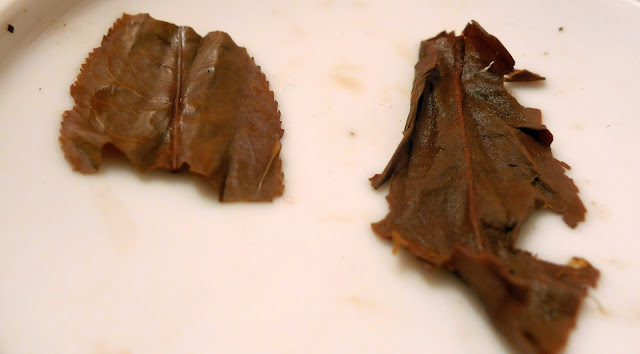I have not been swirling in waves of tea blogging at the time when this cake from Houde aroused suspicion concerning its authenticity. Now, I really tried hard, but I just could not care less personally. Funny, I remember how fixated I used to be on authenticity and known origins of a tea. Of course, I am glad if I know what I am drinking, but I do prefer unknown pleasantness over beautifully specified abomination. The least what I can say about the authenticity of this cake is, that I firmly believe that it is a Bulang cake - I have never met this sort of taste anywhere else.
My experience with puerh from Houde (recent Xizihao and some Cheng Guang He Tang) was mediocre at best, given the prices. This tea is not really that cheap either - I can only guess at the price since I bought just a sample, but if there is a constant ration between sample cost and whole cake cost, this tea would be sold for $105.
The dry leaves are quite nice in my opinion (light brown) and they smell interesting. However, as usual, the aroma of rinsed leaves is deeper and much more intense. I smell slightly aged wood (Marketa says it reminds her of dusty attic beams) and a most pleasant combination of chocolate with raisins.
The first brew is reasonably thick and sweet. The sweetness is the main feature at this stage - but it is a "tasty" sweetness, not pure sweetness without any taste. I guess it is like raisins. Slight camphor note is present, maybe a relict of warmer/wetter storage period?
Further brews are more interesting - there is the chocolate with raisins present, along with abundant and mouth-coating woody sweetness. A bit of agedness is already there. Some forest honey came for a visit occasionally, although I would prefer more; some Bulangs do have it. The bitterness is quite light and not a problem; the tea has a nice hui gan.
The aftertaste is gentle, slightly sour-ish (in a good way), it gives the tea a bit of youthful kick which I like. In appreciation of the aftertaste, I realize that this tea's main taste is really very rounded and smooth - some people might say that it is too smooth I believe (if you blur an image too much, it is very smooth and without unpleasant edges, but a lot of interesting details may be lost). I do enjoy it though - as I do enjoy a tea of this age/storage way.
The feeling in mouth is nothing spectacular (from the point of cooling/tingling sensation - there is nothing unpleasant about how this tea behaves in mouth). This tea makes me feel good overall though - it is calming and soothing in its taste as well as in its energy. I think that the tea has been stored pretty well - it does not have negatives of youth, nor negatives of too fast aging.
(Please excuse the redness of these images - the pink is supposed to be white)
The leaves are not spectacular from today's perspective I believe. They are rather thin, often torn, they break easily when rubbed (there is no shicang in the tea though) and are not as furry as today's fancy cakes.
That said, I enjoyed this tea a lot - I do enjoy this style of Bulang tea. I do not care at all whether the cake comes from Menghai factory, from 1000 years old trees, from a high mountain, where only the members of some secret buddhist brotherhood may tread, harvesting a single most beautiful tea leaf every day and pressing these into a cake at the time of their death.
Sadly, most Bulang teas I meet are hard, dry-woody and often slightly smoky as a bonus (Peacock of Bulang is a good representative). Sort of similar to this tea are the 2005 Menghai Gu Cha - which is way cheaper and actually possibly more interesting in the way of taste - not as blurred (the Jingmai part helps it, of course) - but its lack of sweetness means I can not rate it higher than this tea. Another similar tea is a cake I do not know much about - friends have bought some of it from a shop clerk (or maybe a manager, I can't remember) of Haiwan (the cake was not producet by Haiwan though). All I know is that it is a 2003 Bulang and that it is one of the best teas I have ever tasted... The tea was about two times more expensive than this Bulang Jingpin.
I am glad I have tried this tea - not only it is a good specimen, but it makes sure that my experience with ordering from Houde will not be a purely negative one.





Žádné komentáře:
Okomentovat